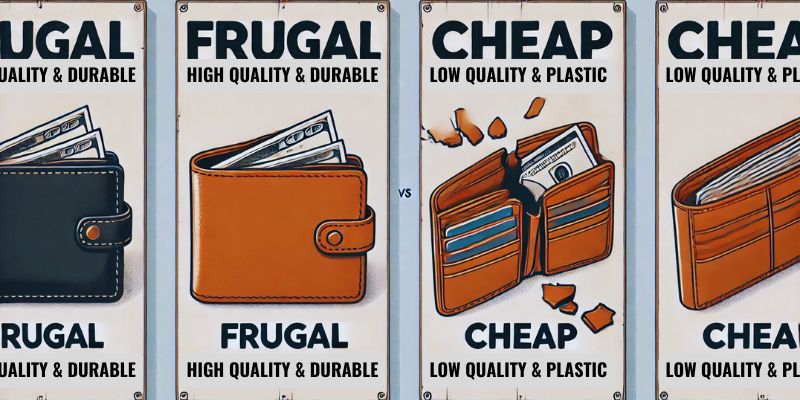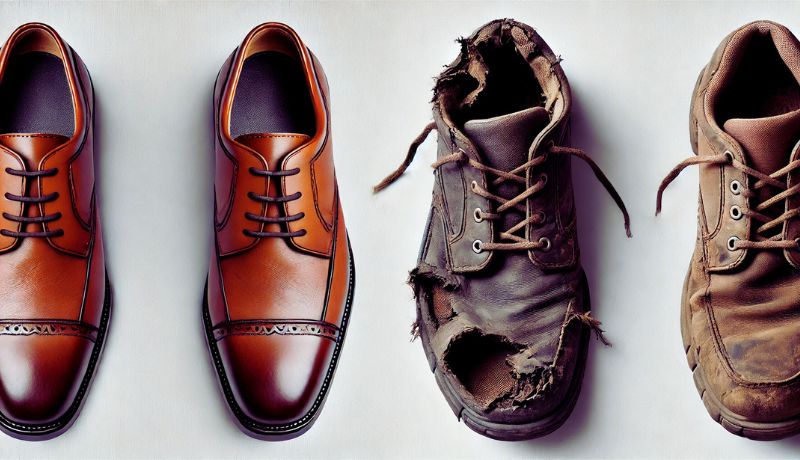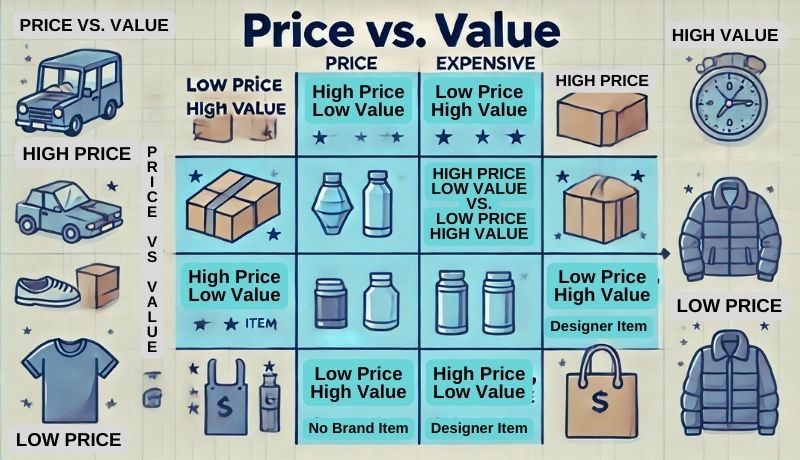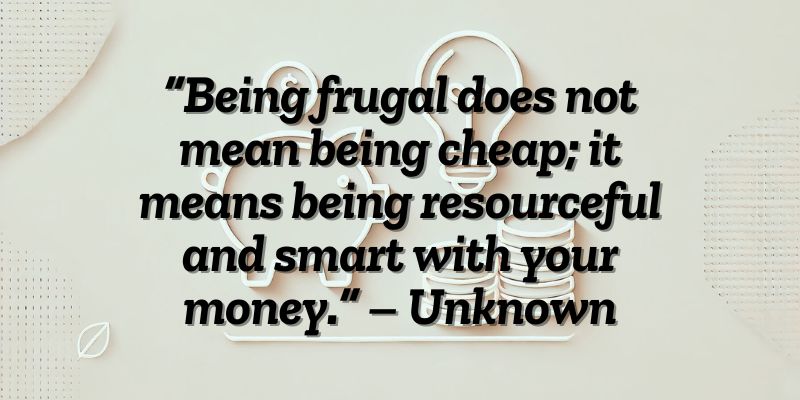
It’s common for people to use the terms “frugal” and “cheap” interchangeably. After all, both concepts revolve around spending less and saving money.
However, there’s a crucial difference between the two. Being frugal is about being intentional and resourceful with your spending while being cheap is often about minimizing costs at the expense of quality, relationships, or long-term benefits.
So, what exactly sets frugal people apart from those who are simply cheap?
Let’s explore the key distinctions and why choosing frugality over cheapness can lead to a more fulfilling and financially stable life.
💡Fun Fact: The word “frugal” comes from the Latin word frugalis, meaning “virtuous” or “useful.” Being frugal has historically been associated with wisdom and good management rather than just spending less!
The Core Differences Between Frugal and Cheap People
While the two might seem similar on the surface, there are three major differences between frugality and cheapness.
Let’s break them down.
1️⃣ Frugal People Value Quality, While Cheap People Focus Only on the Price

Frugal individuals recognize that sometimes, spending a little more upfront can save money in the long run. They invest in durable, high-quality products that last longer, reducing the need for frequent replacements.
Cheap individuals, on the other hand, are solely focused on spending as little as possible, even if it means sacrificing quality.
Example:
Imagine you need a new pair of shoes. A cheap person might buy the least expensive pair available, even if it’s made of low-quality material and wears out within months.
A frugal person, however, would look for a well-made, durable pair—perhaps at a discount or during a sale—knowing that it will last for years.
My Personal Approach:
I consider myself frugal and take pride in making smart financial choices. I don’t buy things impulsively, and when I do, I prioritize quality over price.
For example, unlike some people I know who upgrade their phones every six months, I keep mine for years. To me, a phone is a tool for communication, so I invest in a high-quality one that will serve me well for a long time rather than constantly replacing a cheaper model.
💡Did You Know? Warren Buffett, one of the richest people in the world, is famously frugal. He still lives in the house he bought in 1958 for $31,500 and prefers simple meals over extravagant dining!
2️⃣ Frugal People Prioritize Their Spending, While Cheap People Cut Costs at Any Expense

Frugal people budget their money carefully, ensuring they can enjoy the things that truly matter to them. They might be strategic about cutting costs in certain areas to afford meaningful experiences, like travel, education, or early retirement.
Cheap individuals, however, try to save money on everything, often at the cost of their own happiness and well-being.
Example:
A frugal person may cook at home most of the time but occasionally treat themselves to a nice restaurant meal with family or friends.
A cheap person, on the other hand, might refuse to eat out at all, even if it means missing out on social gatherings and valuable experiences.
My Financial Priorities:
I rarely eat out, not because I don’t enjoy it, but because I choose to allocate my resources elsewhere—towards long-term goals like financial freedom, early retirement, and traveling with my family.
Similarly, a friend of mine dreams of traveling to Europe with her mother before she turns 45. To achieve that goal, she consciously cuts back on buying new gadgets or dining out frequently, directing her savings towards her dream trip instead.
That’s the power of frugality—it’s about making smart choices to create the life you truly want.
💡Frugality in History: During the Great Depression (1929-1939), people had to become extremely frugal, repurposing old clothes, growing their own food, and finding creative ways to stretch every penny. Many of these money-saving strategies are still relevant today!
3️⃣ Frugal People Focus on Value, While Cheap People Focus Solely on Price

The most significant distinction between frugality and cheapness is the understanding of value. Price is what you pay, but value is what you get in return. Cheap individuals focus solely on spending as little as possible, often ignoring whether an item or service offers true value.
Frugal individuals, however, consider both price and quality to ensure they’re making the best decision.
Example:
Imagine you’re hiring a plumber to fix a leaky pipe. A cheap person would go for the lowest bid without considering the plumber’s experience or reviews.
A frugal person, on the other hand, would compare prices but also check for expertise and reliability to ensure the job is done correctly—avoiding more expensive repairs down the road.
How I Apply This in My Life:
Whenever I make a financial decision, I don’t just look at the price tag; I consider the long-term value.
For instance, when buying household appliances, I check reviews, durability, and warranty before making a purchase. Spending a little extra for a high-quality product that lasts longer and requires fewer repairs is, in my opinion, a smarter financial choice.
Why Frugality Leads to a Better Life

Being frugal doesn’t mean depriving yourself, it means making thoughtful, strategic financial choices.
Unlike cheapness, which can negatively impact your quality of life, relationships, and overall happiness, frugality allows you to:
✅ Save money without compromising on quality
✅ Invest in experiences and things that truly matter
✅ Enjoy financial security and long-term stability
✅ Reduce waste and make eco-friendly choices
✅ Live a more fulfilling and balanced life
How to Be Frugal Without Being Cheap
Want to embrace frugality while avoiding the pitfalls of cheapness? Here are some practical tips:
📌Invest in Quality: Buy durable, high-quality products instead of constantly replacing cheap ones.
📌Be Strategic About Savings: Look for deals, discounts, and cashback offers without sacrificing quality.
📌Prioritize Your Spending: Focus on what truly matters to you and cut costs in areas that don’t.
📌Avoid Extreme Penny-Pinching: Don’t sacrifice your well-being or relationships just to save a few bucks.
📌Think Long-Term: Consider the bigger picture when making financial decisions.
Conclusion
There’s a fine line between frugality and cheapness and understanding the difference can significantly impact your financial well-being and overall happiness.
While cheapness is solely about spending the least amount of money possible, frugality is about maximizing value, making smart financial choices, and ultimately leading a more fulfilling life.
So, which side of the line do you want to be on?
What are your thoughts on frugality vs. cheapness? I’d love to hear from you! Share your insights in the comments below. Thanks for reading!

Hi Alice,
This was a great read! I love how you clearly distinguished between being frugal and being cheap—it’s such an important distinction that many people overlook. The emphasis on value over price really stood out to me, especially the example about investing in high-quality items that last longer.
I also appreciate the point about prioritizing spending based on what truly matters. Being frugal isn’t about depriving yourself but about making smart financial choices that align with your goals.Personally, I’ve found that frugality has helped me save money without sacrificing quality of life, and I try to apply it in everyday decisions like meal planning, travel, and big purchases.
Thanks for sharing these insights—I’ll definitely be keeping these tips in mind!
Cheers,
John
Hi John,
Thank you so much for your kind words!
I’m glad you enjoyed the post and found the distinction between frugality and cheapness helpful. It really is about prioritizing value over just the lowest price, and I love that you apply this mindset in your everyday life—especially in areas like meal planning, travel, and big purchases.
Frugality truly is a powerful tool for financial freedom, and as you said, it’s not about deprivation but making intentional choices that align with what matters most. I appreciate you sharing your experience, and I’m happy to know these insights resonated with you!
Thanks again for reading and taking the time to comment. Wishing you all the best on your frugal (but never cheap!) journey! 😊
Cheers,
Alice
Hey,
Thanks for explaining the difference between Frugal and Cheap. After reading your article, I have learned more of the things about it. People tend to lump cheap and frugal together. I say, Frugality is really about finding the center line between being cheap and the opposite side of the spectrum, which is spending. Those who are cheap are often afraid to spend money. They are willing to sacrifice quality, value and time in order to cash in on some short term saving.
You’re exactly right, most people don’t understand what it means to be frugal or cheap. They tend to think that frugality is about spending less without considering the quality of what they’re paying for. Thanks for stopping by and leaving a comment.
This is very true in all ramification, I agree with you. Most people want to purchase an item at the lowest cost; they want to buy items that are very cheap while sacrificing quality at the alter of cheapness.
Frugality may be misconceived to being stingy, but the fact remains that being frugal means being wise and maintaining taste and quality. Frugal people go for quality without minding price, cheap people don’t consider quality they look at low price.
You’re right! Some people might think that being frugal is the same as being stingy but that’s not necessarily the case.
I consider myself frugal because I am after the quality of the items I am looking to buy but I also look at the price because I believe that the monetary value of something is justified by it’s quality. What I’m saying is that, inexpensive things are not always of low quality and expensive items are not always the best, quality-wise.
Thank you for your comment.
You raised an interesting topic for discussion. English is my second language, and never heard of the word frugal, because “cheap” comprised in itself both meanings. It is good to know the difference. Frugal for me is more “resourcefulness,” such as achieve the desirable with limited money.
I can tell that I am frugal as well, because I prefer to have few things but with better quality.
Hi there!
English is my second language too, Ani, hence the word “frugal” is not that popular in my country. Instead, we use the word “thrifty” which basically means “wise-spender.” And when we say that something is cheap, we mean it costs lower so we will be spending less. Today, with the growing popularity of financial advisors, more people have come to understand the difference between frugal and cheap.
If you are only after something that costs less without considering its quality, you are CHEAP but when you think more of the value you get or the quality of the item you are looking to buy, you are FRUGAL.
Thanks for stopping by!
This is a great and much needed post. I used to fall on the side of being cheap thinking I was being frugal, but with cheapness often comes lower quality. I learned the phrase “buy cheap, buy often” and it has helped me a lot to see the value of things as being most important, just not price. Keep up the good work!
Hey Nate,
I used to think that I am frugal because I often buy cheap items. But I did not realize that I was actually being “cheap” and spending more because I had to buy again after only a couple of months. While not everything that’s expensive is of good quality, not anything that costs less is bad either. I believe we can get the best value for the money we spend by looking closely at the products we’re paying for.
Let us choose to be frugal rather than cheap. Thank for your comment.
Thank you Alice for explaining the difference! It seems so obvious now. I will proudly say I am frugal!! I really believe it is important especially with so much material waste and disposable products. I am proud that my children are the same way but worried that they have had the “cheap” influence by family members, I see now they also know the difference 🙂 It is a family event to go thrift store shopping and find great quality items. We are a frugal bunch, I see!
Hi Kathleen,
Parents need to teach their kids the value of money by showing them exactly how because these days, our kids do not do what we say; they do what we do. Avoiding wastes is not having a “cheap” mindset; rather, it’s about knowing the value of things that we spend our money on. Thrift store shopping as a family is a great idea of teaching our kids to become frugal.
Thanks for your comment.
Unfortunately I am neither cheap nor frugal – but after reading your post, I can see the benefits of trying to be more frugal in the way I spend my money! Thank you for sharing these tips, Cheers, Karen
You’re welcome KD and thanks for dropping by. Out of curiosity, if you’re neither cheap nor frugal, which group do you classify yourself based on your spending or saving habits?
Love your article.. I love the fact that I am frugal and not cheap. People need to know the difference ! Good job !
Thanks Dini. Unfortunately, many people still don’t know what it means to be cheap or frugal.
Hi Alice! I completely agree, being too cheap brings nothing but misery. However, on the other hand buying lots of expensive things on a whim brings a broken bank balance.
I believe that it’s important to buy what we really desire, even if it costs a boat load of money. As long as your purchases bring value to your life for a long time to come.
I personally like to live cheap day to day and save my money, some see me now as being “cheap” but what they don’t know is that I’m about to spend my hard earned money on an 8 month expedition around South-east Asia… I’d say that’s going to bring me some value orite 😉
Hey there! I am excited to hear of your upcoming 8-month expedition around South East Asia. That’s gonna be awesome! Living frugally from day to day has definitely saved you enough money to be on vacation for that long. I mean, not many people can afford to not have a job for 8 long months. Wishing you all the best Anthony.
Awesome post. While I was reading it lots of people I know where popping into my head that are prime examples of cheap more so than not and it never seems to pay for them to be that way in the long run and from an outside perspective it can look a bit silly at times. Generally speaking I would say I am too a very frugal person but at times I have gone down the cheap route and it has indeed ending up costing me more so I have learned by my mistakes and that’s why I always pay that bit extra for a pair of quality shoes that I know are going to last longer and be more comfortable instead of buying 2 pairs of cheap ones because the first pair is past it that ends up costing more and not even been as comfortable.
Hi Janette,
You’re absolutely right, there are a lot of cheap people around; some of them are actually the people we know and interact with everyday at work. They think that by going for cheap items they were able to save some money but in reality, they will lose more money if they continue on with this habit. Going down the cheap route will definitely cost you much more and I’m glad you realized that was a big mistake.
And speaking of quality shoes, I also have the same experience. It used to be difficult for me to buy shoes of good quality because I tend to always look at the price. However, after buying one pair of a particular brand that is known to be more expensive but of better quality than others, my cheap mentality started to fade.
Just a reminder though, just because an item is expensive does not necessarily mean it is of high quality. Admittedly, there are products that are very expensive but are poor in quality. In other words, they’re over-priced.
Thanks for your comment. Cheers to us for being frugal, not cheap!
Great article! I totally agree with you on everything. I have had people call me cheap. One time I was out with some people from work and some of my friends outside of work and someone from my work called me cheap, and one of my friends from outside of work said no he is not cheap, he is very particular on what he spends his money on. I never thought of it like that, but he is right on when he says that about me. Thanks for this.
Hello Fred, thanks for stopping by and leaving a comment. And by the way, don’t mind the people who call you cheap when you are actually being frugal. They will realize in the end that you were right all along in not wasting money on unnecessary things or on things that you do not really need because by doing that, you were able to save for something that you really like and want to have. There is a huge difference between being cheap and being frugal but most people haven’t really figured that out yet.
Hi,
Really interesting post and got me thinking. I always check around when buying a product – yes I want it as cheap as possible but without sacrificing the quality. Being frugal works out better in the long term.
Thanks again.
Hey Mark,
We can actually avail of products at a lower price without necessarily sacrificing good quality if we take time to shop around or wait for the items to go on sale. There are also shops and outlets that sell exactly the same high quality products at a lower price, we just have to locate them right. Often times, the difference in prices lies in the fact that some shops are paying more expensive rents, thus they also top up their products cost much higher than the stores or shops that pay their rents at a lower cost.
Bottom line is, it always pays to be frugal rather than cheap.
This is a great article. I definitely agree that there is a difference between being cheap and frugal. I proudly announce too, that I am frugal. I take the same approach. I do not buy cell phones too often because, when the phone that I really like comes out I buy the top quality and I like it so much, that I never have to buy another one for like 2 sometimes 3 years.
I do this with everything, all the way down to buying grocery. I buy in bulk and sometimes, my groceries or house items can last us for months at a time. Which saves us money. I rather save money now so, that one day I can buy that bigger home. Being cheap can cause more headache. In fact, it can cause more money to be spent.
I’ve noticed that sometimes, people can be cheap and put things off, like an oil change. While putting off an oil change can lead to more costly problems. So, it never pays to be cheap. There is always a consequence with being cheap. It best to frugal.
When you purchase quality, the item may be expensive at first but, they usually last a long time. In fact, it usually will out last most products that are purchased in a rush. this is a long run can save money and time. Thank you for this informative post.
Hello Lakisha,
Your example of putting off oil change is a great illustration of how people pay a much higher price as a result of being cheap. They do not realize that being cheap will actually cause them to spend more money.
You’re right, quality items are more expensive but they will last longer than those that are priced lower.
Thanks for your comment.
There is a difference. Getting the best product for your money – frugal. I believe it is better than spending your money on the cheapest goods out there.
Yes, it’s all about quality and value. Although I do not think that more expensive items are always better in quality than cheaper ones, it pays to do your diligence in researching about every product you plan on buying if it’s really worth the price.
Hi great post!
My wife and I often argue about the very points you highlighted. She would often throw the word cheap around because I don’t want to always go out and eat, so I really agree with your point on that. Also with cell phones too, I always buy the last year model and save hundreds of dollars and will use the phone for several years before buying another one (I only use it to talk and go on the internet so why should I care if they have useless features I will never use lol)
Thanks again for a very enlightening article 🙂
Hi Michel,
I’ve been called cheap too, often times, by friends and colleague who do not understand the difference between frugality and cheapness. But I couldn’t care less because I have my eyes fixed on the the prize, which is that at the end of the day, I can have the things that I really want.
I have the same thoughts when it comes to cellphones, there are a lot of apps and features that the latest models of cellphones have which I do not use anyway, so why bother to get new ones every now and then?